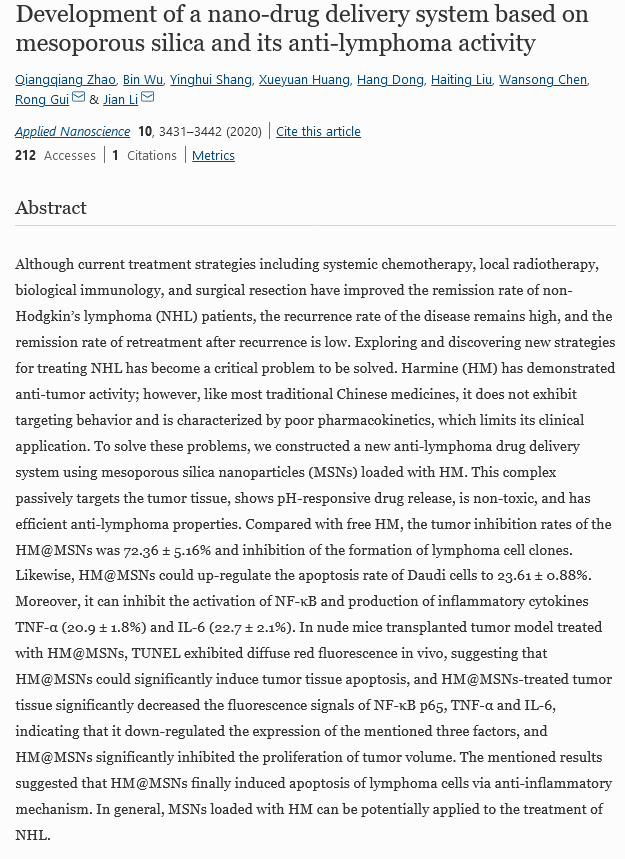22.10.2021
Development of a nano-drug delivery system based on mesoporous silica and its anti-lymphoma activity
Applied Nanoscience, 2020
Abstract
Although current treatment strategies including systemic chemotherapy, local radiotherapy, biological immunology, and surgical resection have improved the remission rate of non-Hodgkin’s lymphoma (NHL) patients, the recurrence rate of the disease remains high, and the remission rate of retreatment after recurrence is low. Exploring and discovering new strategies for treating NHL has become a critical problem to be solved. Harmine (HM) has demonstrated anti-tumor activity; however, like most traditional Chinese medicines, it does not exhibit targeting behavior and is characterized by poor pharmacokinetics, which limits its clinical application. To solve these problems, we constructed a new anti-lymphoma drug delivery system using mesoporous silica nanoparticles (MSNs) loaded with HM. This complex passively targets the tumor tissue, shows pH-responsive drug release, is non-toxic, and has efficient anti-lymphoma properties. Compared with free HM, the tumor inhibition rates of the HM@MSNs was 72.36 ± 5.16% and inhibition of the formation of lymphoma cell clones. Likewise, HM@MSNs could up-regulate the apoptosis rate of Daudi cells to 23.61 ± 0.88%. Moreover, it can inhibit the activation of NF-κB and production of inflammatory cytokines TNF-α (20.9 ± 1.8%) and IL-6 (22.7 ± 2.1%). In nude mice transplanted tumor model treated with HM@MSNs, TUNEL exhibited diffuse red fluorescence in vivo, suggesting that HM@MSNs could significantly induce tumor tissue apoptosis, and HM@MSNs-treated tumor tissue significantly decreased the fluorescence signals of NF-κB p65, TNF-α and IL-6, indicating that it down-regulated the expression of the mentioned three factors, and HM@MSNs significantly inhibited the proliferation of tumor volume. The mentioned results suggested that HM@MSNs finally induced apoptosis of lymphoma cells via anti-inflammatory mechanism. In general, MSNs loaded with HM can be potentially applied to the treatment of NHL.
This article features nanoComposix mesoporous silica products in a drug delivery application.
>> View article


